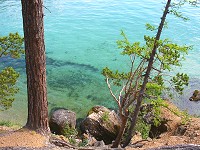| Origin & Development | |
|
Legends & Fairy tales • Earth's Crust Thickness • Underwater Relief • Landscapes • History & Formation • Seismic Activity • | |
| History of Lake Baikal | |
|
History of Explorations • Inhabitants & Settlers • First maps of Baikal • Archaeological Sites • | |
| Lake Baikal Climate | |
|
Introduction • Fogs • Winds & Waves • Ice Conditions • | |
| Fauna & Vegetation | |
|
Mammals • Baikal seal - Nerpa • Ichthyofauna • Invertebrates • Vegetation • | |
| Water of Lake Baikal | |
|
Colour • Transparency • Temperature • Pressure • Depth • Currents • Budget • Chemical Composition • Pollution • | |
| Recreational Areas | |
|
Circumbaikal Railway • Peschanaya Bays • Olkhon Island • Chivirkuysky Gulf • Wooden Irkutsk • Trans-Siberian Railway • | |
| People of Lake Baikal | |
|
People of Siberia • Buryat nation in Baikal • Russians in Baikal • | |
|
| |
| The face of Baikal - Water © A description of Baikal's water & questions concerning its pollution by S.A.Gurulev Lake Baikal Water Chemical Composition
Baikal water, especially in the deepest parts of its great mass, has a surprisingly constant chemical composition. River waters, and especially the waters of the Selenga influence the concentration of individual ions in the water. Some components vary spatially and seasonally. First and foremost this concerns the biogenic elements - Si, P, N, and also oxygen, carbonic acid and organic substances. Silicon and phosphorous in the water are used by diatomic algae, after death the remains of these settle on the floor of the lake, forming diatomic silt. The silicon and phosphorous end up in this silt where, for example, as much as 500,000 tons of silicon earth settles yearly. The fate of nitrogen in the cycle of matter has as yet not been cleared up. Organic matter in water is subject to decay, and part of this also goes into the floor sediments. Baikal waters situated at a distance from human settlements and particularly deep waters are quite pure, as researchers at the Limnological Institute have shown, in the bacteriological sense, and only near settlements does slight bacterial pollution of the waters occur including bacteria that are dangerous to human health. The low level of mineralization of Baikal's water is due to the low mineralization of the waters of its tributaries. The Selenga, the lake's main tributary, brings water with an average mineralization of 126.81 mg/l, the Verkhnaya Angara - 81.31, and Barguzin - 134.47. Most mineralized are the waters of the river Buguldeika which reaches 300 mg/1. The low mineralization of the water of the tributaries can be accounted for by the fact that the Baikal basin is composed mostly of metamorphic and magmatic rock not containing easily dissolved minerals. The river Buguldeika washes away carbonate and, possibly, salt-bearing rocks. Like the waters of the lake itself, the waters of the tributaries are neutral or slightly alkaline in their degree of acidity (pH 7.0 - 8.2). The microelement content of Baikal water has not been sufficiently studied, but it is known that, for example, the heavy metal content is extremely low. |
